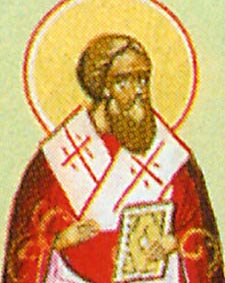Hieromartyr Irenaeus the Bishop of Lyons
 The Hieromartyr Irenaeus, Bishop of Lyons, was born in the year 130 in the city of Smyrna (Asia Minor). He received there the finest education, studying poetics, philosophy, rhetoric, and the rest of the classical sciences considered necessary for a young man of the world.
The Hieromartyr Irenaeus, Bishop of Lyons, was born in the year 130 in the city of Smyrna (Asia Minor). He received there the finest education, studying poetics, philosophy, rhetoric, and the rest of the classical sciences considered necessary for a young man of the world.
His guide in the truths of the Christian Faith was a disciple of the Apostle John the Theologian, Saint Polycarp of Smyrna (February 23). Saint Polycarp baptized the youth, and afterwards ordained him presbyter and sent him to a city in Gaul then named Lugdunum [the present day Lyons in France] to the dying bishop Pothinus.
A commission was soon entrusted to Saint Irenaeus. He was to deliver a letter from the confessors of Lugdunum to the holy Bishop Eleutherius of Rome (177-190). While he was away, all the known Christians were thrown into prison. After the martyric death of Bishop Pothinus, Saint Irenaeus was chosen a year later (in 178) as Bishop of Lugdunum. “During this time,” Saint Gregory of Tours (November 17) writes concerning him, “by his preaching he transformed all Lugdunum into a Christian city!”
When the persecution against Christians quieted down, the saint expounded upon the Orthodox teachings of faith in one of his fundamental works under the title: Detection and Refutation of the Pretended but False Gnosis. It is usually called Five Books against Heresy (Adversus Haereses).
At that time there appeared a series of religious-philosophical gnostic teachings. The Gnostics [from the Greek word “gnosis” meaning “knowledge”] taught that God cannot be incarnate [i.e. born in human flesh], since matter is imperfect and manifests itself as the bearer of evil. They taught also that the Son of God is only an outflowing (“emanation”) of Divinity. Together with Him from the Divinity issues forth a hierarchical series of powers (“aeons”), the unity of which comprise the “Pleroma”, i.e. “Fullness.” The world is not made by God Himself, but by the aeons or the “Demiourgos,” which is below the “Pleroma.”
In refuting this heresy, championed by Valentinus, Saint Irenaeus presents the Orthodox teaching of salvation. “The Word of God, Jesus Christ, through His inexplicable blessedness caused it to be, that we also, should be made that which He is ... ,” taught Saint Irenaeus. “Jesus Christ the Son of God, through exceedingly great love for His creation, condescended to be born of a Virgin, having united mankind with God in His own Self.” Through the Incarnation of God, creation becomes co-imaged and co-bodied to the Son of God. Salvation consists in the “Sonship” and “Theosis” (“Divinization”) of mankind.
In the refutation of another heretic, Marcian, who denied the divine origin of the Old Testament, the saint affirms the same divine inspiration of the Old and the New Testaments: “It is one and the same Spirit of God Who proclaimed through the prophets the precise manner of the Lord’s coming,” wrote the saint. “Through the apostles, He preached that the fulness of time of the filiation had arrived, and that the Kingdom of Heaven was at hand.”
The successors of the Apostles have received from God the certain gift of truth, which Saint Irenaeus links to the succession of the episcopate (Adv. Haer. 4, 26, 2). “Anyone who desires to know the truth ought to turn to the Church, since through Her alone did the apostles expound the Divine Truth. She is the door to life.”
Saint Irenaeus also exerted a beneficial influence in a dispute about the celebration of Pascha. In the Church of Asia Minor, there was an old tradition of celebrating Holy Pascha on the fourteenth day of the month of Nisan, regardless of what day of the week it happened to be. The Roman bishop Victor (190-202) forcefully demanded uniformity, and his harsh demands fomented a schism. In the name of the Christians of Gaul, Saint Irenaeus wrote to Bishop Victor and others, urging them to make peace.
After this incident, Saint Irenaeus drops out of sight, and we do not even know the exact year of his death. Saint Gregory of Tours, in his Historia Francorum, suggests that Saint Irenaeus was beheaded by the sword for his confession of faith in the year 202, during the reign of Severus.
The Apostle and Evangelist John the Theologian, Saint Polycarp of Smyrna, and Saint Irenaeus of Lyons are three links in an unbroken chain of the grace of succession, which goes back to the Original Pastor, our Lord Jesus Christ Himself.
In his old age, Saint Irenaeus wrote to his old friend the priest Florinus: “When I was still a boy, I knew you... in Polycarp’s house.... I remember what happened in those days more clearly than what happens now.... I can describe for you the place where blessed Polycarp usually sat and conversed, the character of his life, the appearance of his body, and the discourses which he spoke to the people, how he spoke of the conversations which he had with John and others who had seen the Lord, how he remembered their words, and what he heard from them about the Lord ... I listened eagerly to these things, by the mercy of God, and wrote them, not on paper, but in my heart.”

